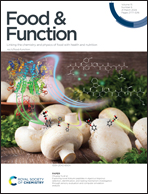The protective effect of l-theanine on the intestinal barrier in heat-stressed organisms†
Abstract
Heat stress caused by heatwaves, extreme temperatures, and other weather can damage the intestinal barrier of organisms. L-Theanine (LTA) attenuates heat stress-induced oxidative stress, inflammatory responses, and impaired immune function, but its protective effect on the intestinal barrier of heat-stressed organisms is unclear. In this study, low (100 mg kg−1 d−1), medium (200 mg kg−1 d−1), and high (400 mg kg−1 d−1) dosages of LTA were used in the gavage of C57BL/6J male mice that were experimented on for 50 d. These mice were subjected to heat stress for 2 h d−1 at 40 ± 1 °C and 60 ± 5% RH in the last 7 d. LTA attenuated the heat stress-induced decreases in body mass and feed intake, and the destruction of intestinal villi and crypt depth; reduced the serum levels of FITC-dextran and D-LA, as well as the DAO activity; and upregulated the colonic tissues of Occludin, Claudin-1, and ZO-1 mRNA and occludin protein expression. The number of goblet cells in the colon tissue of heat-stressed organisms increased in the presence of LTA, and the expression levels of Muc2, Muc4 mRNA, and Muc2 protein were upregulated. LTA increased the abundance of Bifidobacterium and Turicibacter, and decreased the abundance of Enterorhabdus and Desulfovibrio in the intestinal tract of heat-stressed organisms and restored gut microbiota homeostasis. LTA promoted the secretion of IL-4, IL-10, and sIgA and inhibited the secretion of TNF-α and IFN-γ in the colon of heat-stressed organisms. The expressions of Hsf1, Hsp70, Hsph1, TLR4, P38 MAPK, p-P65 NF-κB, MLCK mRNA, and proteins were downregulated by LTA in the colon of heat-stressed organisms. These results suggest that LTA protects the intestinal barrier in heat-stressed organisms by modulating multiple molecular pathways. Therefore, this study provides evidence on how tea-containing LTA treatments could be used to prevent and relieve intestinal problems related to heat stress.



 Please wait while we load your content...
Please wait while we load your content...